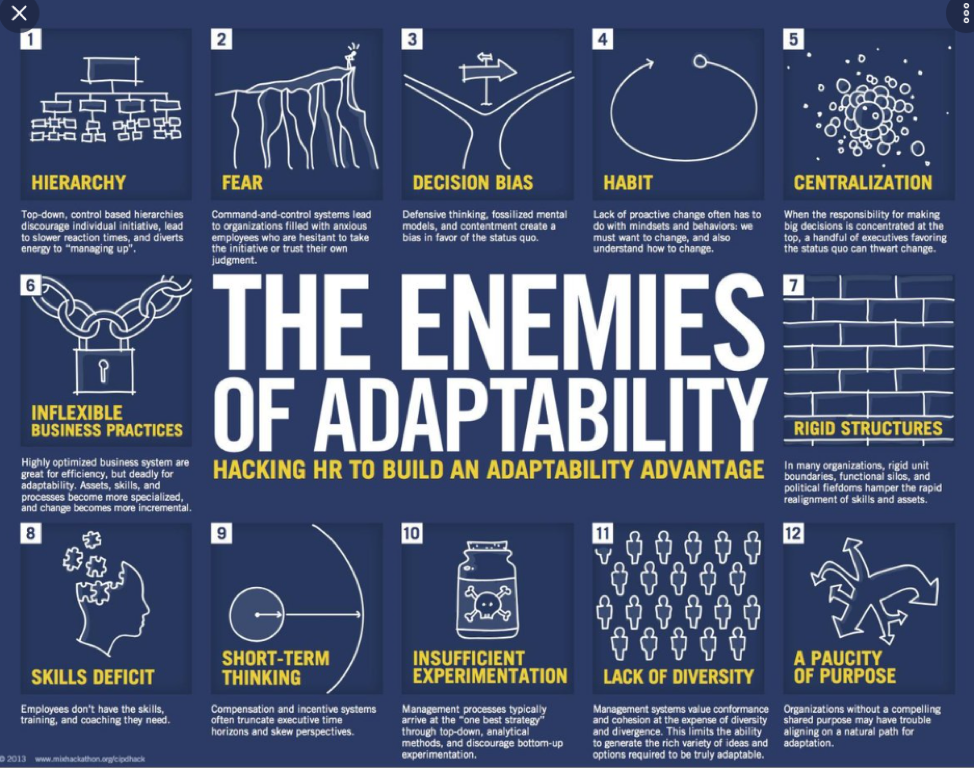
Adaptability is a big buzzword right now. Makes sense, the CoronaVirus has up-ended the status quo and everyone needs to be able to adjust to their new conditions.
If everyone values the ability to pivot and adapt, why then are we seeing such inertia?
The answer? Adaptability is more of a mindset and approach versus systems and tools.
I was out running this morning. I have been back and forth with runs, cycling and rucking, overall I am pleased with some of my progress and less so with others. For this week I wanted to start a new program: 5km run on Monday, 10km ruck on Tuesday and a 20km cycle on Wednesday (rinse and repeat for R, F, Sa - day off Sunday).
I knew the route I had been using for my runs up until this point was just shy of 4km, so to keep it one continuous flow, I changed the route to what was closer to a solid 5km loop.
The run started fine (the first few minutes always make you think it will be easy all the way!). As you get out of that first phase and you find yourself about 20 or 25% complete you start to have to push a bit.
My goal was to do the 5km at pretty much the same pace, without stopping (now I'm more of a gorilla than gazelle so you might need to up the distance to relate).
As you start to 'force' a little bit more with each step, I started focusing on what I could experiment with and get immediate feedback with respect to how I was feeling.
I started focusing on my breathing. The depth of my inhales and exhales, the ration of in vs out, nose vs mouth. From there I looked at my stride. How long, how short, what was the feedback my body was giving me? Temperature, how would removing my hat and undoing my jacket make me feel as I started to cool off a bit?
My point here was playing with and tweaking things that were completely under my control allowed me to learn in the moment and to continually make small adjustments and cadence.
Result ... I finished the run as planned, without stopping and at the same relative pace.
This is all great, but how does it relate to the challenges that we face today in our professional lives?
The answer? We should look at our ability to adapt at work the same way.
I find it interesting how people have a tendency to accept certain types of things or approaches in their personal lives, yet the second they walk through the doors of the office, they forget about it.
How many times have you had your coworker, boss or president imply that real change only can come with the next shiny thing? The new system, the new org structure, the new data ...
We have a tendency in business to equal tools to solutions.
The reality is, tools are just that tools; and like any tool, their value is directly related to how well their are wielded.
Open your mind to the possibility of more.
Adaptability at work is the exact same thing. You will succeed when you try. Once you identify an area that could be executed better, try something different (experiment) and see what the results are.
Are they what you expected? If yes, great. If no, why not?
When it's a why not, what is the next thing you can tweak and change to get you back towards your goal?
We have created cultures within our organizations where people are afraid to experiment. We are rewarded for success and 'punished' for failure, and we are so afraid to look 'stupid', how could we ever have thought something like THAT would SOLVE the problem?
The truth is, as long as you are focused on your goal, as long as you are trying to improve and make the results better ... you are not failing (and don't let anyone tell you that you are); one of my favourite quotes answers this by saying "you haven't failed, you simply learned a way that does not work". Take that to heart.
Keep it simple:
• Know your goal
• Know why you feel your experiment / tweak / change moves you closer to it
• Make sure you are able to measure and get immediate feedback
• Reality vs expectations
• Try again
As our circumstances keep changing, so must your mindset and approach. When you can do this, you are adapting.

Comments
Post a Comment